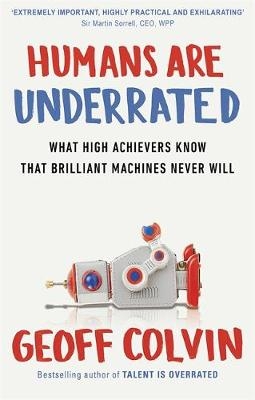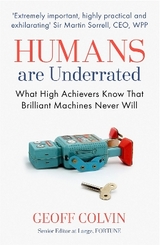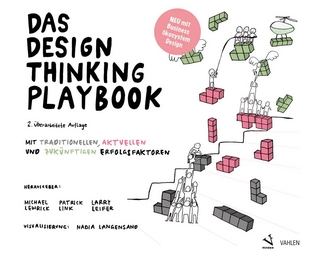
Humans are Underrated
What High Achievers Know That Brilliant Machines Never Will
Seiten
2015
Nicholas Brealey Publishing (Verlag)
978-1-85788-637-5 (ISBN)
Nicholas Brealey Publishing (Verlag)
978-1-85788-637-5 (ISBN)
- Titel ist leider vergriffen;
keine Neuauflage - Artikel merken
Zu diesem Artikel existiert eine Nachauflage
What hope will there be for us when computers take over most of the tasks that people now get paid to do? Humans are Underrated shows us we must look to unlikely places, learn from the best, and cultivate the human abilities that make us unique.
What hope will there be for us when computers can drive cars better than humans, do intricate legal work, identify faces, scurry helpfully around offices and factories, even perform some surgeries, all faster, more reliably, and less expensively than people? It's easy to imagine a frightening future in which computers simply take over most of the tasks that people now get paid to do. While we'll still need high-level decision makers and computer developers, those tasks won't keep most working-age people employed or allow their living standard to rise. The unavoidable question will millions of people lose out, unable to best the machine is increasingly dominating business, education, economics, and policy. The bestselling author of Talent Is Overrated explains how the abilities that will prove most essential to our success are no longer the technical, classroom-taught left-brain skills that economic advances have demanded from workers in the past.
Instead, our greatest advantage lies in what we humans are most powerfully driven to do for and with one another, arising from our deepest, most essentially human abilities empathy, creativity, social sensitivity, storytelling, humour, building relationships, and expressing ourselves with greater power than a machine mind can ever achieve. This is how we create durable value that is not easily replicated by technology because we re hardwired to want it from humans. These high-value skills create tremendous competitive advantage more devoted customers, stronger cultures, breakthrough ideas, and more effective teams. And while many of us regard these abilities as innate traits, he's a real people person, she's naturally creative, it turns out they can all be developed. Leading businesses, medical clinics and even the U.S. Army are now emphasising human interaction and empathy in their training programmes.
Meanwhile, studies have shown that our increasing reliance on technology for interaction and entertainment is not only making us less happy, trusting and likely to achieve good grades, it is also damaging our abilities to recognise emotion and harmonise with others the very skills we will need to prosper. As technology advances, we shouldn't focus on beating computers at what they do we ll lose that contest. Instead, we must develop our most essential human abilities and teach our children to value not just technology but also the richness of interpersonal experience. They will be the most valuable people in our world because of it. Colvin proves that to a far greater degree than most of us ever imagined, we already have what it takes to be great.
What hope will there be for us when computers can drive cars better than humans, do intricate legal work, identify faces, scurry helpfully around offices and factories, even perform some surgeries, all faster, more reliably, and less expensively than people? It's easy to imagine a frightening future in which computers simply take over most of the tasks that people now get paid to do. While we'll still need high-level decision makers and computer developers, those tasks won't keep most working-age people employed or allow their living standard to rise. The unavoidable question will millions of people lose out, unable to best the machine is increasingly dominating business, education, economics, and policy. The bestselling author of Talent Is Overrated explains how the abilities that will prove most essential to our success are no longer the technical, classroom-taught left-brain skills that economic advances have demanded from workers in the past.
Instead, our greatest advantage lies in what we humans are most powerfully driven to do for and with one another, arising from our deepest, most essentially human abilities empathy, creativity, social sensitivity, storytelling, humour, building relationships, and expressing ourselves with greater power than a machine mind can ever achieve. This is how we create durable value that is not easily replicated by technology because we re hardwired to want it from humans. These high-value skills create tremendous competitive advantage more devoted customers, stronger cultures, breakthrough ideas, and more effective teams. And while many of us regard these abilities as innate traits, he's a real people person, she's naturally creative, it turns out they can all be developed. Leading businesses, medical clinics and even the U.S. Army are now emphasising human interaction and empathy in their training programmes.
Meanwhile, studies have shown that our increasing reliance on technology for interaction and entertainment is not only making us less happy, trusting and likely to achieve good grades, it is also damaging our abilities to recognise emotion and harmonise with others the very skills we will need to prosper. As technology advances, we shouldn't focus on beating computers at what they do we ll lose that contest. Instead, we must develop our most essential human abilities and teach our children to value not just technology but also the richness of interpersonal experience. They will be the most valuable people in our world because of it. Colvin proves that to a far greater degree than most of us ever imagined, we already have what it takes to be great.
Geoff Colvin is Fortune's senior editor-at-large and is also the author of Talent is Overrated and The Upside of the Downturn. He has served as moderator of the Fortune Global Forum, where he has interviewed Bill Gates, Jack Welch, Herb Kelleher, Peter Drucker and other business legends. Colvin graduated Harvard cum-laude with a B.A. in Economics, and received his MBA from New York University's Stern School.
| Erscheint lt. Verlag | 3.9.2015 |
|---|---|
| Sprache | englisch |
| Maße | 156 x 234 mm |
| Themenwelt | Informatik ► Software Entwicklung ► User Interfaces (HCI) |
| Sozialwissenschaften | |
| Wirtschaft ► Betriebswirtschaft / Management ► Unternehmensführung / Management | |
| ISBN-10 | 1-85788-637-2 / 1857886372 |
| ISBN-13 | 978-1-85788-637-5 / 9781857886375 |
| Zustand | Neuware |
| Informationen gemäß Produktsicherheitsverordnung (GPSR) | |
| Haben Sie eine Frage zum Produkt? |
Mehr entdecken
aus dem Bereich
aus dem Bereich
Mit traditionellen, aktuellen und zukünftigen Erfolgsfaktoren
Buch | Softcover (2018)
Franz Vahlen (Verlag)
CHF 41,70
Aus- und Weiterbildung nach iSAQB-Standard zum Certified Professional …
Buch | Hardcover (2023)
dpunkt Verlag
CHF 48,85
Wissensverarbeitung - Neuronale Netze
Buch | Hardcover (2023)
Carl Hanser (Verlag)
CHF 48,95



